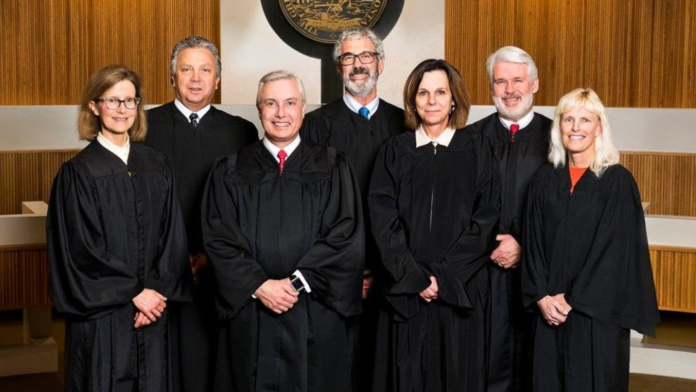HELENA — After several weeks of legal wrangling, the Montana Supreme Court has sidestepped several statutes and procedural rules to allow a pro-abortion ballot measure to move forward. Supporters of the measure believe they’re close to starting their signature-gathering efforts.
Throughout the process the measure has been informally known as “Ballot Issue 14,” but Montana Secretary of State Christi Jacobsen’s office has now given it an official title of Constitutional Amendment 128. It’s sponsored by the ballot committee Montanans Securing Reproductive Rights, which is a political front group for Planned Parenthood Advocates and ACLU Montana.
CI-128 would add language to the state constitution, establishing an affirmative right to an abortion and preventing the state from regulating abortions. This would make abortion the only medical procedure that state cannot regulate.
On Monday, the Montana Supreme Court approved the wording for CI-128, which will appear on petition forms for voter signatures and potentially on the ballot if it meets the signature qualifying criteria.
Typically, following the approval of the ballot statement, a proposed initiative proceeds to a state legislative interim committee for review and a vote on whether to endorse or oppose it before it undergoes signature collection. Although the vote doesn’t dictate the initiative’s progress, its outcome is reflected on petition forms.
In a footnote within their Monday decision, Supreme Court Justice Ingrid Gustafson pointed out a legislative review occurs only subsequent to the attorney general’s determination of the legal sufficiency of a proposed initiative. In the case of CI-128, Attorney General Austin Knudsen deemed it insufficient, yet the Supreme Court overruled his decision.
This is a different tact than the Court took with CI-126, which similarly was deemed insufficient by the Attorney General and overturned by the Supreme Court. Critics pointed to the more than $300,000 Planned Parenthood had spent on Justice Gustafson’s 2022 campaign as the likely source of her favorable treatment for CI-128.
Interpreting the Court’s ruling as authorization to commence gathering signatures for CI-128 without undergoing the review process, supporters of the initiative sought to expedite the signature-gathering process. They returned to the court, demanding that Jacobsen furnish them with a petition form for collecting signatures.
On Thursday, an order signed by five out of seven Supreme Court justices reiterated that their language did not permit a legislative review in this instance. It directed Jacobsen to provide the plaintiffs with a petition form by Friday afternoon or provide a reason by Monday as to why she didn’t.
Jacobsen and Knudsen swiftly protested, contending that they had not been properly served and insisting on having another opportunity to respond. They pointed out that state law and the court rules require them to be properly served before the Court had jurisdiction to issue an order.
Nevertheless, on Friday morning, the court issued another order, saying their Thursday order would stand while not explaining why they were not following the law.
Meanwhile, legislative leaders have been consistently arguing that the Legislature still needs to have a say on CI-128. On Tuesday, Senate President Sen. Jason Ellsworth, R-Hamilton, sent Jacobsen a legislative subpoena for records on the measure so a committee could review it.
On Friday afternoon, the Secretary of State’s Office said they had complied with both the Supreme Court’s order and the subpoena.
“Despite having to navigate the many complexities—including the rewritten rules, circumvention of branches, and lack of due process—surrounding what’s typically an ordinary procedure, as we’ve stated from the beginning, the Secretary of State’s Office is committed to complying with Montana law,” said Richie Melby, Jacobsen’s spokesman.
Montanans Securing Reproductive Rights confirmed to multiple media outlets they had received the petition form. The form included a note stating if hadn’t gone through the standard process.
“Voters are advised that unlike the other 2024 ballot issues, the Montana Supreme Court ordered that the ordinary process which authorizes the Legislature to have either an interim committee or an administrative committee of the legislature review the content of this initiative prior to circulation does not apply to this petition,” the statement said. “Pursuant to that Montana Supreme Court Order, the finalized sample petition is approved for signature collection.”
Legislative leadership announced that they had scheduled a review of CI-128 in the Law and Justice Interim Committee, on April 18 at 9 a.m.
MSRR told media outlets Friday that they were continuing to review the petition.
“With a petition review taking place, the next phase of signature collection is close,” the group said in a statement. “This process has been unnecessarily complicated, and rife with bad actors constructing ridiculous obstacles. Despite all of that, we are elated to be one step closer to signature collection. Montana voters deserve to make their voices heard on this critical issue, and today marks an important step in moving forward.”
The committee has previously alleged that state officials are deliberately impeding the initiative’s progress to hinder their signature-gathering efforts, although they have not presented specific evidence to support these claims.
The Attorney General’s Office noted that they maintained the Court acted improperly.
“The Montana Supreme Court’s directives have cast even more serious doubts on the validity of this initiative and created unnecessary conflict and uncertainty regarding the constitutional separation of powers in an apparent effort to get the desired outcome for their campaign donors,” a Department of Justice spokesperson.
The Court has not provided any additionally information why CI-128 was treated differently than other ballot measures.
To meet the requirements for inclusion on the November ballot, sponsors of CI-128 must gather over 60,000 signatures from registered voters throughout Montana, with a minimum quota from 40 out of the state’s 100 legislative districts. These signatures must be submitted by June 21st.
By: Montana Newsroom staff




